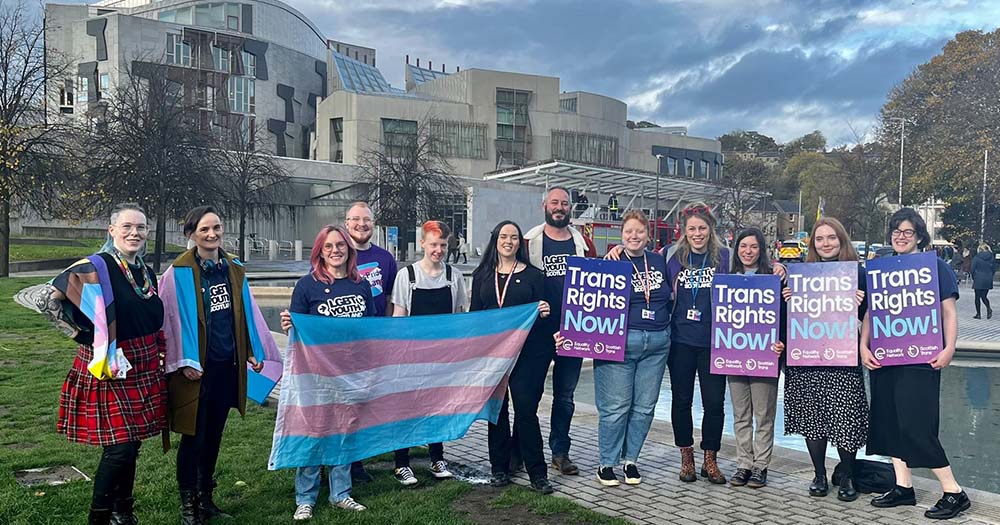The landmark Gender Recognition Reform bill which was created to streamline Scotland’s gender recognition process passed its first round of votes on Thursday, October 27.
A large demonstration of supporters gathered outside and rallied for change while MSPs debated inside the chamber. The bill strives to accelerate the process for Trans people obtaining a gender recognition certificate (GRC) in Scotland so they can amend the legal sex printed on their birth certificates to match their gender identity.
Scottish LGBTQ+ activists have urged politicians to amend the legislation which was established in 2004. Vic Valentine, who manages the Scottish Trans Organisation, said:
“A vote for this bill is a vote to improve the lives of Trans men and women across Scotland. The current law means that people have to go through an intrusive, complex and stressful process to update the sex on their birth certificate, and be recognised as who they really are.”
The current system requires people to live with their gender identity for two years before they are able to obtain a GRC, and the process can take additional years due to the NHS gender clinic wait lists. It also includes a medical requirement and forces Trans people to go before a gender recognition panel before they can apply.
The new bill reduces the wait time required to apply for the certificate from two years to three months, and it eliminates the need to present medical reports. Instead of having to go before the Gender Recognition Panel, individuals are able to begin the GRC process at the Registrar General. It also decreases the age restriction for obtaining a GRC from 18 to 16 which means that young people will be able to begin their adult lives with legal documents that accurately reflect their gender identities.
SPONSORED CONTENT
The legislation passed after the first round of votes with an overwhelming majority, as 88 Scottish politicians voted in favour and 33 MSPs voted against.
However, Thursday’s proceedings did not come without controversy. One Scottish government minister for community safety, Ash Regan, resigned in protest before the vote saying, “I have considered the issue of gender recognition reform very carefully over some time. I have concluded that my conscience will not allow me to vote with the government at the stage one of the bill this afternoon.”
Earlier this year, Scotland allowed Trans people to accurately self-identify on their census, and Scotland’s new gender bill is another major step forward for Trans rights.
LGBTQ+ advocates are happy with the progress forward, but recognise that additional changes are needed. For example, the current iteration of the bill does not include non-binary people.
The bill will now move on to the second stage where amendments will be considered.
© 2022 GCN (Gay Community News). All rights reserved.
Support GCN
GCN is a free, vital resource for Ireland’s LGBTQ+ community since 1988.
GCN is a trading name of National LGBT Federation CLG, a registered charity - Charity Number: 20034580.
GCN relies on the generous support of the community and allies to sustain the crucial work that we do. Producing GCN is costly, and, in an industry which has been hugely impacted by rising costs, we need your support to help sustain and grow this vital resource.
Supporting GCN for as little as €1.99 per month will help us continue our work as Ireland’s free, independent LGBTQ+ media.
